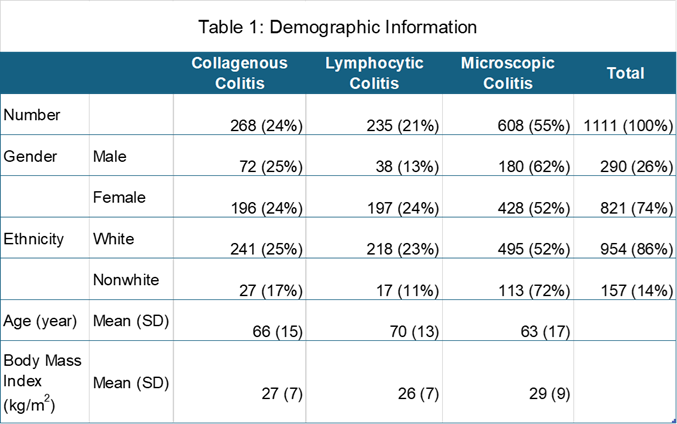Tuesday Poster Session
Category: Colon
P4597 - Investigating Severe Microscopic Colitis Requiring Inpatient Hospitalization
- NM
Nadia Mishal, MD
HCA - LewisGale Medical Center - 1900 Electric RoadSalem, VA 24153UNITED STATES - Salem, VA
Salem, VA
Presenting Author(s)
HCA - LewisGale Medical Center - 1900 Electric RoadSalem, VA 24153UNITED STATES - Salem, VA, Salem, VA
Introduction:
Microscopic colitis (MC) is a type of inflammatory colitis characterized by chronic watery diarrhea in the absence of endoscopic changes in the colon. The condition has a rising incidence in high income nations and has been associated with several medications, including nonsteroidal anti-inflammatory drugs and proton pump inhibitors. The two forms of MC are lymphocytic colitis (LC) and collagenous colitis (CC). Relapsing or refractory MC offer challenges to treatment, and this study aims to further investigate factors contributing to MC.
Methods:
The data is collected from the Hospital Corporation of America Healthcare enterprise database between the date range 01-01-2017 to 01-01-2022. The patient population is adults diagnosed with MC. Patients were excluded if they had a prior history of inflammatory bowel disease, infectious diarrhea, or eosinophilic colitis. A total of 1554 patients met the inclusion criteria, while exclusions: 289 for insufficient demographic information, 127 met the exclusion criteria, and 48 identified as duplicate charts for a total sample size of 1111 patients. A re-presentation to the emergency department (ED) for acute diarrhea was considered an event of relapsing MC.
Results:
Of the 1111 cases, the composition was: CC 268 cases (24%), LC 235 cases (21%), and unspecified MC 608 cases (55%). Of all the MC cases, patients used nonsteroidal anti-inflammatory agents 24%, proton pump inhibitors 34%, selective serotonin reuptake inhibitors 26%, and serotonin norepinephrine reuptake inhibitors 11%. Overall, a rate of 18% of patients re-presented to the ED, with 25% of those patients having CC, 17% having LC, and 57% having unspecified MC. Patients were treated with corticosteroids 152, budesonide 180, mesalamine 46, or other agents 285. In this study, the rates of readmission for the types of MC were 15% for LC and 18% for CC, compared to 19% for unspecified MC. There was not a statistically significant difference in the likelihood for readmission when differentiated by age, body mass index, gender, ethnicity, or subtype. While not statistically significant, the risk was more likely with CC than LC.
Discussion:
Medications associated with MC include PPI and NSAIDs, with the former being more common than the latter in this study. The relapsing rates for MC in this study are estimated at 18%. There is a need for further study in characteristics that are associated with higher relapse rates in MC treatment.
Figure: Table 1 details the demographic information for the patient population, where SD means standard deviation
Disclosures:
Nadia Mishal indicated no relevant financial relationships.
Chuan Loong Miao indicated no relevant financial relationships.
Timothy Kristedja indicated no relevant financial relationships.
Nadia Mishal, MD, Chuan Loong Miao, MD, Timothy Kristedja, MD. P4597 - Investigating Severe Microscopic Colitis Requiring Inpatient Hospitalization, ACG 2025 Annual Scientific Meeting Abstracts. Phoenix, AZ: American College of Gastroenterology.
